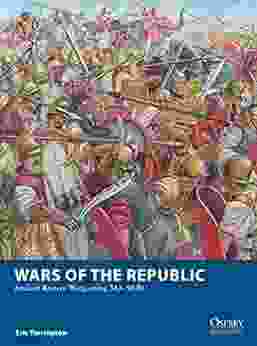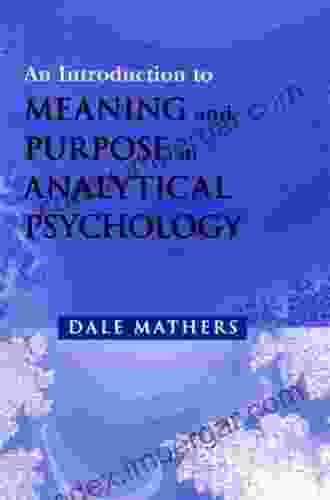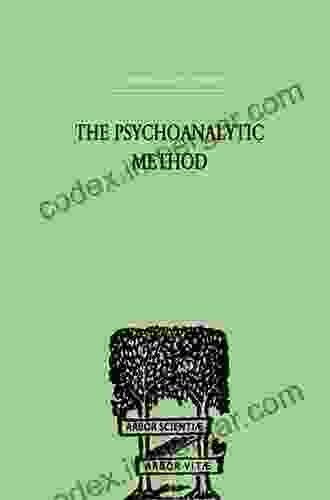The Psychoanalytic Method: Unlocking the Secrets of the Human Mind

The psychoanalytic method is a powerful tool for understanding the human mind and treating mental illness. Developed by Sigmund Freud in the late 19th century, psychoanalysis is based on the belief that unconscious processes play a major role in our thoughts, feelings, and behaviors. Psychoanalytic therapy helps patients to become aware of these unconscious processes and to work through them, leading to greater self-awareness and emotional well-being.
4.7 out of 5
| Language | : | English |
| File size | : | 2065 KB |
| Text-to-Speech | : | Enabled |
| Screen Reader | : | Supported |
| Enhanced typesetting | : | Enabled |
| Word Wise | : | Enabled |
| Print length | : | 626 pages |
The History of Psychoanalysis
Sigmund Freud developed psychoanalysis in the late 19th century. Freud was a neurologist who was interested in the treatment of mental illness. He began by using hypnosis to help patients recover memories of traumatic events that they had repressed. However, Freud soon realized that hypnosis was not always effective, and he began to develop a new method of therapy that he called psychoanalysis.
Psychoanalysis is based on the belief that unconscious processes play a major role in our thoughts, feelings, and behaviors. Freud believed that these unconscious processes are often the result of repressed memories of traumatic events. Psychoanalytic therapy helps patients to become aware of these unconscious processes and to work through them, leading to greater self-awareness and emotional well-being.
The Basic Concepts of Psychoanalysis
The psychoanalytic method is based on a number of basic concepts, including:
- The unconscious mind: The unconscious mind is a reservoir of thoughts, feelings, and memories that are not accessible to conscious awareness. These unconscious processes can nevertheless have a major impact on our thoughts, feelings, and behaviors.
- Repression: Repression is a defense mechanism that protects the conscious mind from anxiety-provoking thoughts and feelings. Repressed memories are stored in the unconscious mind and can continue to influence our behavior even though we are not aware of them.
- Transference: Transference is a process by which patients transfer their unconscious feelings and attitudes towards their parents or other significant figures onto the therapist. Transference can be a powerful tool for therapy, as it can help patients to become aware of their unconscious conflicts and to work through them.
- Free association: Free association is a technique in which patients are encouraged to say whatever comes to mind, without censorship or editing. Free association can help patients to access their unconscious thoughts and feelings.
- Dream analysis: Dreams are a window into the unconscious mind. Dream analysis can help patients to understand their unconscious conflicts and to work through them.
The Psychoanalytic Method in Practice
Psychoanalytic therapy is a long-term process that can take several years to complete. Therapy typically takes place in a private setting, and patients are encouraged to talk about their thoughts and feelings freely. The therapist will help patients to become aware of their unconscious processes and to work through them. Psychoanalytic therapy can be a challenging process, but it can also be very rewarding. Patients who complete psychoanalysis often report feeling greater self-awareness, emotional well-being, and satisfaction in life.
The Benefits of Psychoanalysis
Psychoanalysis can be a very effective treatment for a wide range of mental health problems, including:
- Anxiety disFree Downloads
- Depression
- Obsessive-compulsive disFree Download
- Phobias
- Post-traumatic stress disFree Download
- Personality disFree Downloads
Psychoanalysis can also be helpful for people who are struggling with relationship problems, grief, or other life stressors. Psychoanalysis can help people to understand themselves better and to develop healthier coping mechanisms.
The psychoanalytic method is a powerful tool for understanding the human mind and treating mental illness. Psychoanalysis can help people to become more aware of their unconscious processes and to work through them, leading to greater self-awareness, emotional well-being, and satisfaction in life.
If you are struggling with mental health problems, psychoanalysis may be a helpful treatment option for you. Talk to your doctor or mental health professional to learn more about psychoanalysis and to see if it is right for you.
References
- Freud, S. (1900). The Interpretation of Dreams. New York: Basic Books.
- Freud, S. (1915). The Unconscious. Standard Edition, 14:159-215.
- Laplanche, J., & Pontalis, J.-B. (1973). The Language of Psychoanalysis. New York: W. W. Norton & Company.
- Mitchell, S. A., & Black, M. J. (1995). Freud and Beyond: A History of Modern Psychoanalytic Thought. New York: Basic Books.
4.7 out of 5
| Language | : | English |
| File size | : | 2065 KB |
| Text-to-Speech | : | Enabled |
| Screen Reader | : | Supported |
| Enhanced typesetting | : | Enabled |
| Word Wise | : | Enabled |
| Print length | : | 626 pages |
Do you want to contribute by writing guest posts on this blog?
Please contact us and send us a resume of previous articles that you have written.
 Book
Book Novel
Novel Page
Page Chapter
Chapter Text
Text Story
Story Genre
Genre Reader
Reader Library
Library Paperback
Paperback E-book
E-book Magazine
Magazine Newspaper
Newspaper Paragraph
Paragraph Sentence
Sentence Bookmark
Bookmark Shelf
Shelf Glossary
Glossary Bibliography
Bibliography Foreword
Foreword Preface
Preface Synopsis
Synopsis Annotation
Annotation Footnote
Footnote Manuscript
Manuscript Scroll
Scroll Codex
Codex Tome
Tome Bestseller
Bestseller Classics
Classics Library card
Library card Narrative
Narrative Biography
Biography Autobiography
Autobiography Memoir
Memoir Reference
Reference Encyclopedia
Encyclopedia Charles M Quinn
Charles M Quinn Bobbie Garrison
Bobbie Garrison Bryan C Keene
Bryan C Keene Brian J Cudahy
Brian J Cudahy Jasmine Lee O Neill
Jasmine Lee O Neill Bradley S Tice
Bradley S Tice Brenda Flynn
Brenda Flynn Kim Han
Kim Han Maureen Trudelle Schwarz
Maureen Trudelle Schwarz Brad Spellberg
Brad Spellberg Bryan Lane
Bryan Lane Robert Tower
Robert Tower Jeff Cooper
Jeff Cooper Clyde Edgerton
Clyde Edgerton Bruno Lemaitre
Bruno Lemaitre Brian Payton
Brian Payton Brian Kateman
Brian Kateman Michael E Shay
Michael E Shay Lawrence T Orcher
Lawrence T Orcher Robert Dickens
Robert Dickens
Light bulbAdvertise smarter! Our strategic ad space ensures maximum exposure. Reserve your spot today!

 Virginia WoolfWars of the Republic: An Epic Saga of Conflict, Strategy, and the Rise of a...
Virginia WoolfWars of the Republic: An Epic Saga of Conflict, Strategy, and the Rise of a...
 George Bernard ShawThe Actor Hollywood Forgot: Rediscovering the Legacy of Urville Martin
George Bernard ShawThe Actor Hollywood Forgot: Rediscovering the Legacy of Urville Martin
 Ted SimmonsPractical Child and Adolescent Psychopharmacology: A Comprehensive Guide for...
Ted SimmonsPractical Child and Adolescent Psychopharmacology: A Comprehensive Guide for...
 Jaime MitchellUnveiling the Enigma: Rumours of Glory Memoir Explores an Extraordinary Life...
Jaime MitchellUnveiling the Enigma: Rumours of Glory Memoir Explores an Extraordinary Life... Jett PowellFollow ·11.3k
Jett PowellFollow ·11.3k Dan BellFollow ·3.3k
Dan BellFollow ·3.3k VoltaireFollow ·12.2k
VoltaireFollow ·12.2k Ike BellFollow ·17.7k
Ike BellFollow ·17.7k Daniel KnightFollow ·8k
Daniel KnightFollow ·8k Harold BlairFollow ·6.4k
Harold BlairFollow ·6.4k Walt WhitmanFollow ·15k
Walt WhitmanFollow ·15k Clark CampbellFollow ·18.9k
Clark CampbellFollow ·18.9k

 Gary Cox
Gary CoxUnlocking Meaning and Purpose in Life: An Exploration of...
In an increasingly...

 Eric Hayes
Eric HayesMemoirs of the Early Pioneer Settlers of Ohio Illustrated
A Window into the Lives of Courageous...

 J.R.R. Tolkien
J.R.R. TolkienThe Montgomerys and Their Descendants: A Saga of Courage,...
Prepare to be...

 Avery Simmons
Avery SimmonsThe Rifle Musket: The Dawn of Modern Infantry Warfare
: The rifle musket, a revolutionary...

 Jesse Bell
Jesse BellUnlock the Power of Excel with VBA and Macros: A...
Microsoft Excel is a powerful spreadsheet...
4.7 out of 5
| Language | : | English |
| File size | : | 2065 KB |
| Text-to-Speech | : | Enabled |
| Screen Reader | : | Supported |
| Enhanced typesetting | : | Enabled |
| Word Wise | : | Enabled |
| Print length | : | 626 pages |






